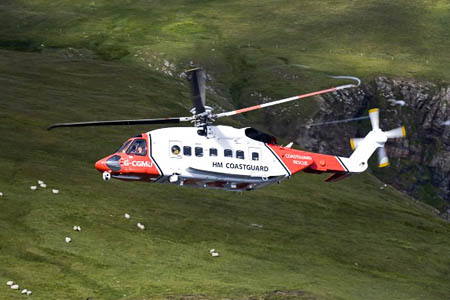Mountain rescuers in Scotland have welcomed the decision to introduce privatised search and rescue helicopters to replace those of the Royal Navy and Royal Air Force.
But the Mountain Rescue Committee of Scotland said walkers, climbers and rescuers owe a debt of gratitude to the servicemen and women who have operated the Sea Kings and earlier helicopters.
The committee said: “For the last 70 years search and rescue helicopter support to the 27 Scottish mountain rescue teams across the country has been largely provided by the RAF and the Royal Navy, using first the Wessex and latterly the Sea King helicopters, with the yellow Sea King helicopter becoming particularly well known in the North of Scotland.
“This service provided by the Ministry of Defence has been exceptional with a high level of joint working and partnership between the Scottish mountain rescue teams and the crews from RAF Lossiemouth and from Royal Navy Gannet at Prestwick.”
But the committee said it welcomed the news that the ageing Sea Kings would be replaced by more modern Sikorsky S-92s and AgustaWestland 189 aircraft, operated by Bristow.
The chair of the MRCofS Jonathan Hart said: “Scottish mountain rescue owes an enormous debt of gratitude to the SAR crews over the years from both the Royal Navy and the RAF.
“They have provided an incredibly high level of support to the mountain rescue teams across the country and are held in very high esteem both by rescue team members and thousands of casualties and missing persons whom they have recovered.
“However, Scottish mountain rescue very much welcomes the announcement of the Bristow contract and the opportunity to introduce new, more reliable aircraft into mountain rescue service.
“I am particularly pleased with the addition of updated and improved S92s and the introduction of the AW189, thus providing team leaders a range of aircraft that they can request depending on the nature of the rescue they are responding to.
“With approximately 60 per cent of all Scottish mountain rescues occurring within a 30-minute flight of Fort William, the new announcement that there will be a base at Inverness airport is particularly good news for all mountain users.
“The new aircraft are faster, have the most modern avionics and communications systems and importantly will transfer casualties to the right hospital in a shorter time. These improvements in service are all very welcome.
“Scottish mountain rescue teams will be discussing training and familiarisation plans with Bristow, so that all team members are familiar with the new equipment and we look forward to developing a relationship with Bristow aircrews that will continue the outstanding service that has been provided so successfully by the MoD crews over the last 70 years.”

Ian
06 April 2013Of course you will, it hardly needs stating.